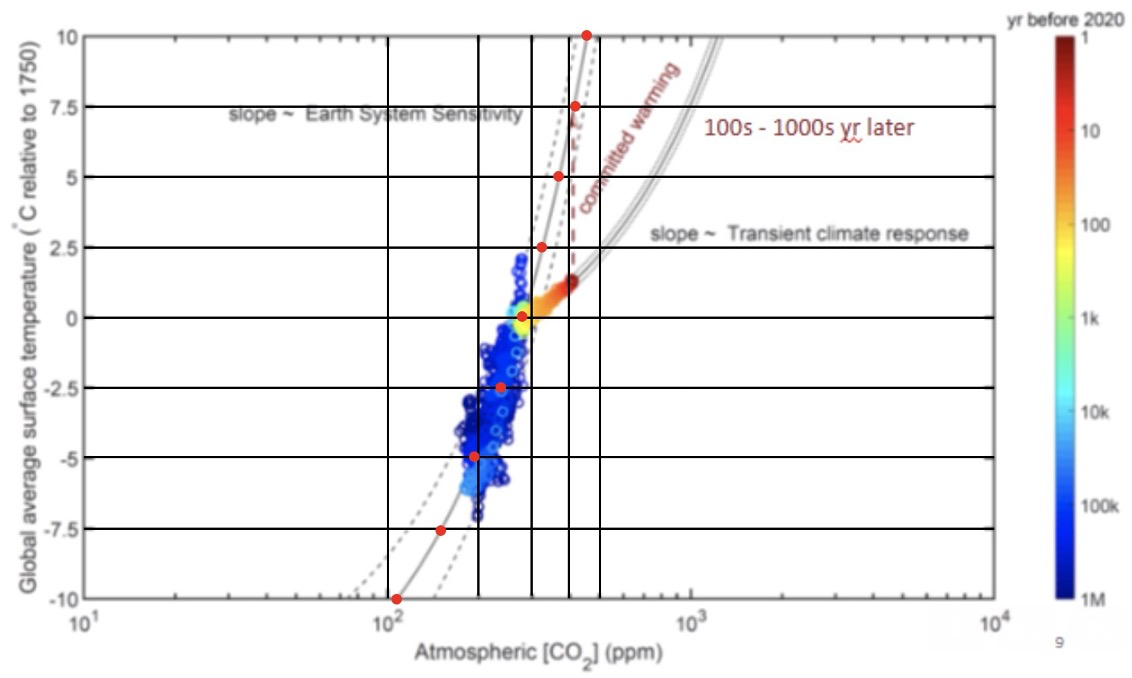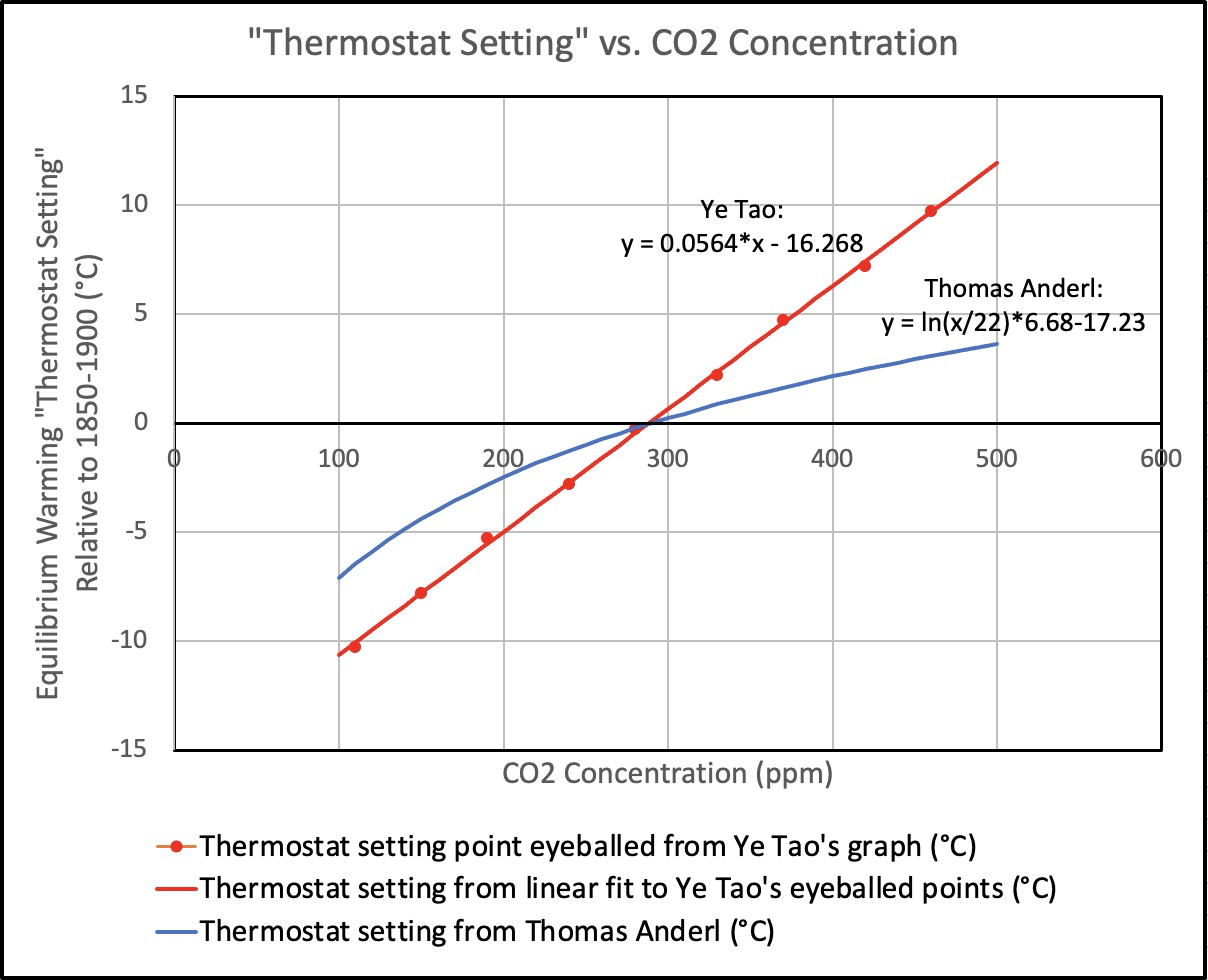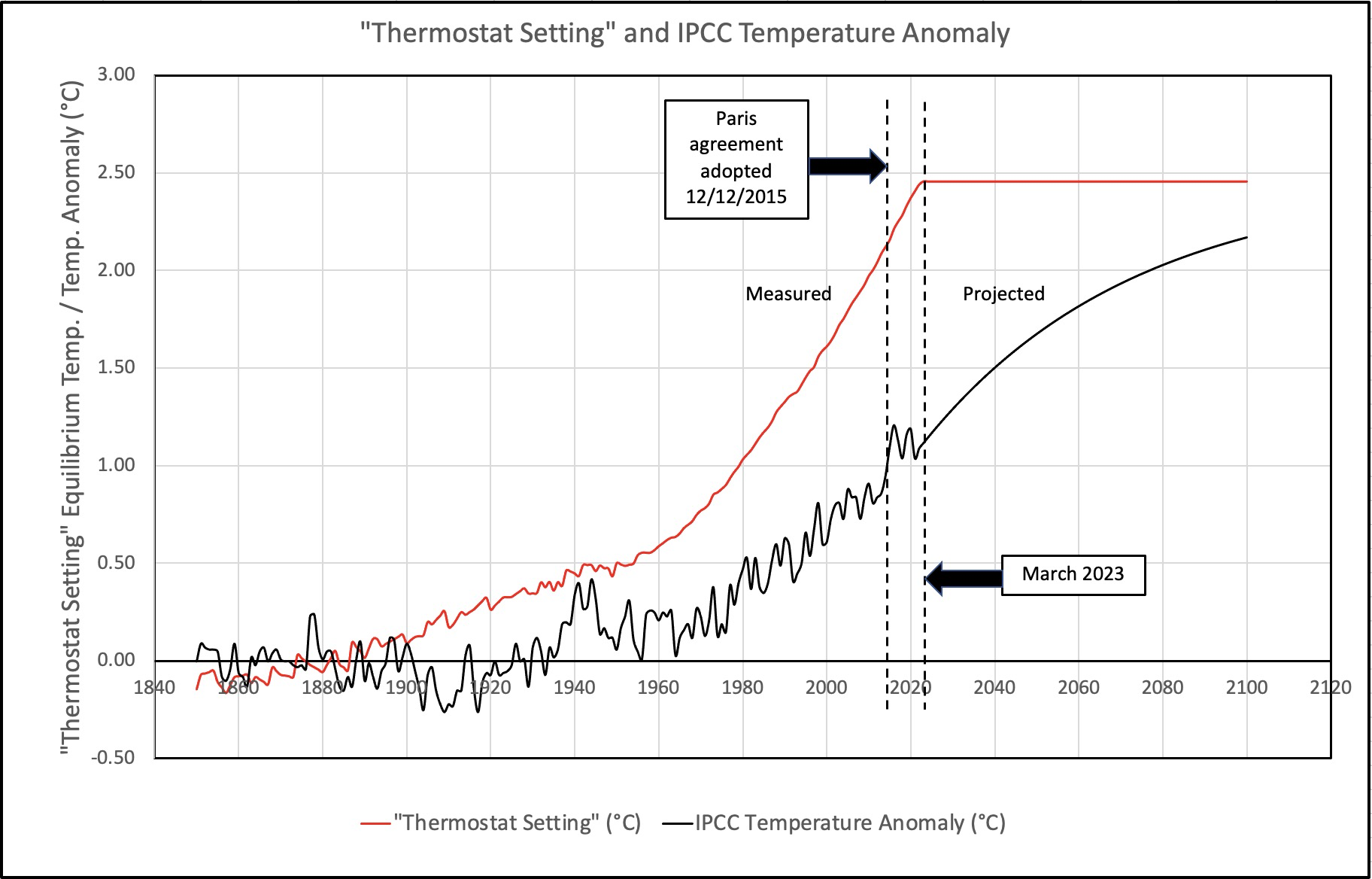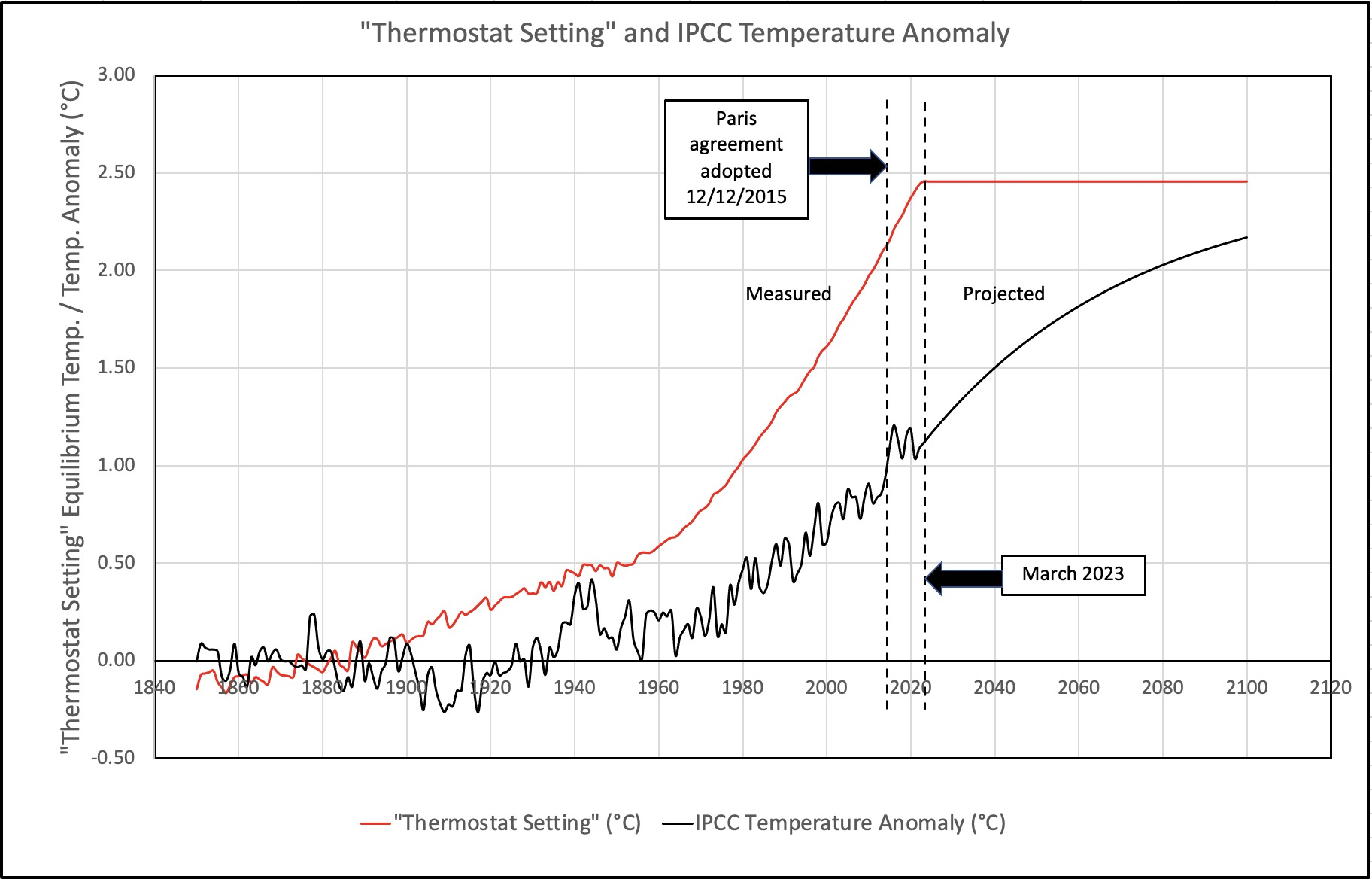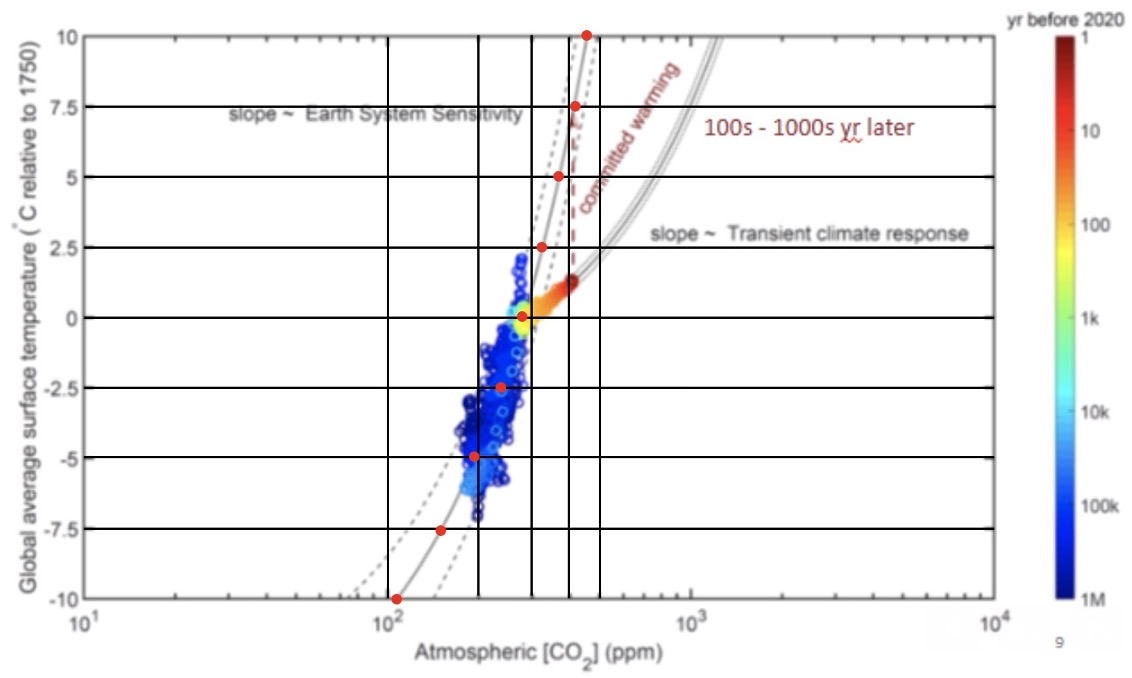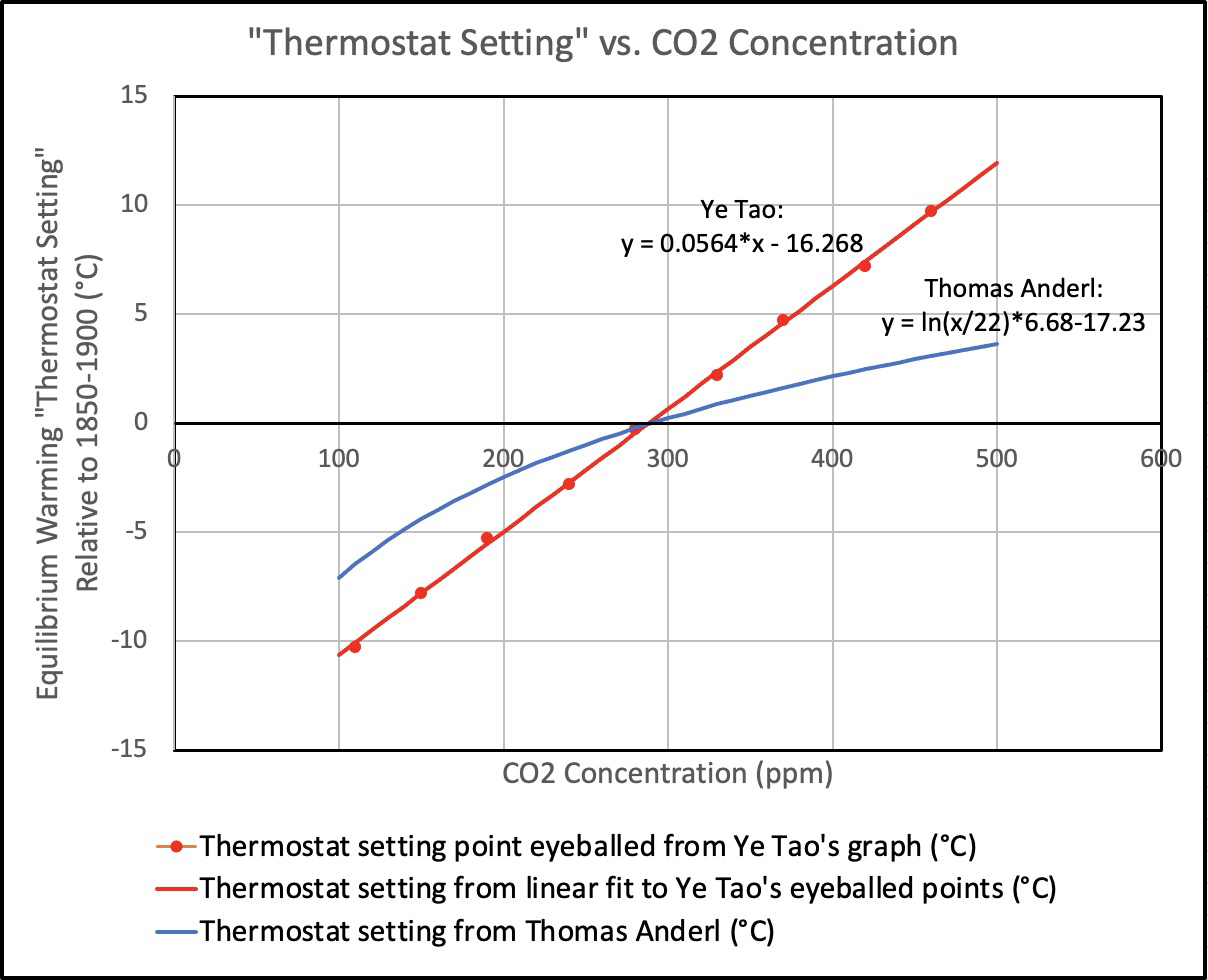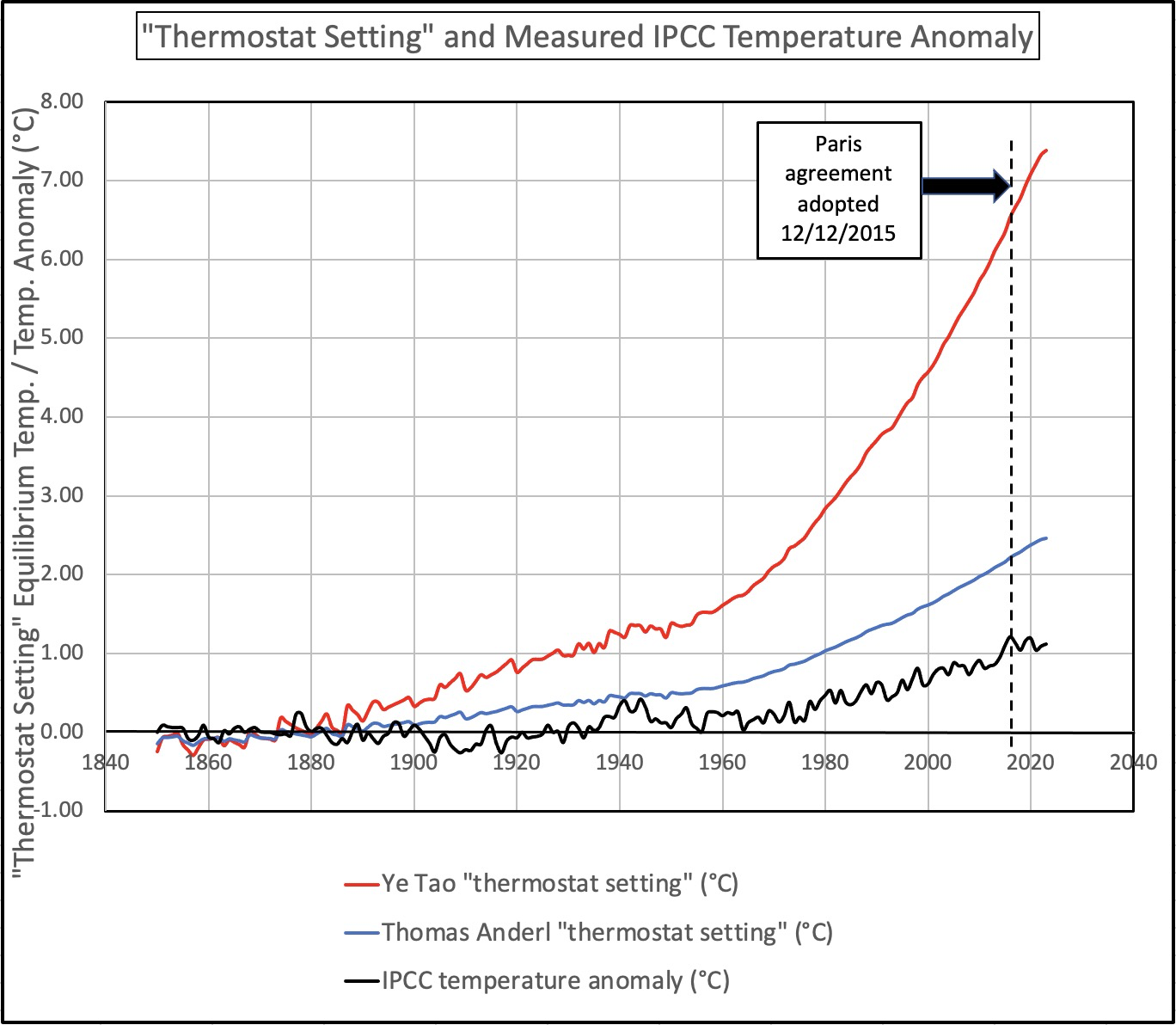Re: Temperature trajectory
H simmens
On Mar 16, 2023, at 1:03 PM, lee mcnair <dragon...@gmail.com> wrote:
This might be a silly suggestion but what might happen if you posted a poster of an old fashioned mercury thermometer rising higher and higher over time maybe superimposed over a picture of the globe on Twitter and other social media with a simple message. Maybe something like global scorching is already out of control. Tell your lawmakers to fund cooling technology research NOW before it's too late!I'm not a scientist, just an ordinary person but I would understand that. And I think you need ordinary earthlings to start talking about this so it couldn't be a one-time deal. You'd have to follow up at least weekly with more info and maybe direction on who to write/phone/advocate with in different geographic locations.Lee McNair (she, her)
"May you be filled with loving kindness.
May you be safe from inner and outer harm.
May you be healthy in body and mind.
May you find Peace and be truly happy. "
Find out whose land you’re on at https://native-land.ca/
I live on the lands of the
Nacotchtank (Anacostan) or the lands of the
Piscataway.
--On Thu, Mar 16, 2023, 11:16 AM Ben Ballard <benwb...@gmail.com> wrote:--Hello PRAG and all,Thank you for entertaining my question two PRAG calls ago regarding beliefs about future temperature trajectories. I believe most people, including many climate scientists, aren't open to unconventional solutions like PRAG's in part because they don't truly recognize the severity of the crisis.It has taken about 30 years for most people to agree that:- The climate is changing, and people are the cause- Severe impacts will occur at 1.5°C warming, with catastrophic impacts at 2.0°C- We're now at about ~1.1°C warming and climbing rapidly, with bad impacts already happening- Climate change impacts are already much worse than had been anticipated for 1.1°C warmingThis is a good start. Unfortunately, a widespread belief in the flawed carbon budget concept leads many people and organizations (including IPCC, CarbonBrief, Global Carbon Project, Mercator Research on Global Commons and Climate Change, Climate Clock, University of Edinburgh, and many more) to think further GHG emissions are needed to increase warming from the current ~1.1°C level to the severe 1.5°C and catastrophic 2.0°C levels and beyond. In reality, emissions have already "pushed Earth's thermostat up" well above 2.0°C, and we are just waiting for Earth's temperature to catch up.Before geoengineering can take hold, I believe we need to get this message across to the widest possible audience, both technical and technical. For your consideration, I propose a simplified but adequately accurate thermostat analogy, in which:1) CO2 concentration drives global temperature, much as a home thermostat drives house temperature2) For every CO2 concentration there is a corresponding equilibrium global temperature, analogous to the home thermostat settingSimplifications in the analogy err on the optimistic/conservative side:3) Earth's temperature takes time to respond to CO2 concentration changes, like the time it takes house temperature to respond to a thermostat setting change- CO2 emissions stop now, and future atmospheric concentration is fixed at its current level- translation from CO2 concentration to equilibrium temperature follows Thomas Anderl's logarthmic fit to 400 My paleoclimate models, which is more conservative than Ye Tao's linear fit to 800,000 year ice core data- future global temperatures approach the equilibrium "thermostat setting" according to an exponential decay with a 50 year time constant (parameterized time constant open to suggestion)- warming from non-CO2 GHG's is ignored- global temperature is assumed spatially uniform; e.g., the impact of Arctic amplification is ignored- tipping points and other nonlinearities and hystereses are not consideredThe result is a simple, wildly optimistic, bounding, defensible "best case" "Net Zero 2023" trajectory:In this scenario,- the "global thermostat" setting reached- 2.0°C in 2011- 2.2°C at the adoption of the Paris Agreement in 2015- 2.5°C in March 2023- global temperature anomaly relative to the IPCC 1850-1900 "ppre-industrial era" will reach- 1.5°C in 2040- 2.0°C in 2077- 2.2°C in 2100Then, qualitatively, we can argue that warming and impacts will actually be greater for each of the model simplifications. For example,- GHG emissions are actually increasing, continuing to push the "thermostat setting" ever higher instead of leveling off- if GHG emissions do decrease, some aerosol cooling will be lost- warming is greater than shown due to unmodeled non-CO2 GHG's- there is probably more "committed warming in the pipeline" (to combine Ye Tao's and James Hansen's terminology) than this model includes- the Arctic is warming 4x faster than the global average, bringing on multiple near-term tipping points- etc.The intent is to debunk the carbon budget concept and make a compelling case that at ~420 ppm CO2 Earth is already headed for well above 2.0°C warming, without requiring detailed climate science knowledge from the audience.Please let me know if you think this communication strategy might have merit, as I am just a retired engineer and not a scientist!Thanks, and cheers,Ben Ballard------------------If interested, here are some more details on how I arrived at this model:Ye Tao's excellent diagram shows how Earth's temperature has varied in response to slow vs. fast changes in CO2 concentration over the last 800,000 years (I love the use of color to represent time on a logarithmic scale!):The blue samples and main trend line show equilibrium warming vs. CO2 concentration from 800,000 years ago until ~200 years ago, when GHG concentration changed only very slowly and temperature stayed close to the main trend line. This is like pushing your home thermostat up or down no more than ~one degree per day; you would hardly notice the difference between the thermostat setting and the house temperature.On the other hand, the yellow, orange and red samples from the last 200 years show that as we pushed CO2 concentration up very quickly, Earth's temperature hasn't been able to rise quickly enough to stay on the main trend line. This is like suddenly pushing your home thermostat way up - it takes a while for the house temperature to respond, during which time the house remains colder than the thermostat setting. If we stop pushing Earth's thermostat up (i.e., increasing CO2 concentration), temperature will continue to rise until it eventually reaches the equilibrium temperature for the CO2 concentration. The sharp angle between the blue main trend line and the yellow-to-red transient response curve is an indication of the time constant for global temperature to respond to CO2 concentration changes.The next diagram shows two possible conversions from atmospheric CO2 concentration to equilibrium global temperature (i.e., the "global thermostat setting"), relative to the IPCC 1850-1900 "pre-industrial era" baseline. The red scale is Ye Tao's main trend line from above, but with the x axis converted from logarithmic to linear; the 9 points "eyeballed" from the graph above fall very nearly on a straight line, so this conversion is modeled as a straight linear function. The second conversion scale is from Thomas Anderl, and is a logarithmic fit to paleoclimatic simulations going back 400 million years.The diagram below uses measured CO2 concentrations from 1850 to 2023 to show the corresponding equilibrium temperature "thermostat settings" for each of the two conversion scales (red and blue), and measured warming for the same time period (black).Even Thomas Anderl's more conservative scale indicates that we humans had already set Earth's thermostat to 2.2°C warming when we adopted the Paris agreement in 2015, and it now stands at 2.5°C due to the CO2 emissions in the subsequent 8 years. The difference between the the black and blue lines represents the lag in Earth temperature response to increasing CO2 concentration.
You received this message because you are subscribed to the Google Groups "Healthy Planet Action Coalition (HPAC)" group.
To unsubscribe from this group and stop receiving emails from it, send an email to healthy-planet-action...@googlegroups.com.
To view this discussion on the web visit https://groups.google.com/d/msgid/healthy-planet-action-coalition/CAOJO1XatWx1ooegKmGbAwYb8t9v7FHx1-S_BtOpqu9N2cjsLNQ%40mail.gmail.com.
For more options, visit https://groups.google.com/d/optout.
You received this message because you are subscribed to the Google Groups "Healthy Planet Action Coalition (HPAC)" group.
To unsubscribe from this group and stop receiving emails from it, send an email to healthy-planet-action...@googlegroups.com.
To view this discussion on the web visit https://groups.google.com/d/msgid/healthy-planet-action-coalition/CAKzN3YzGBKGKaPFda%2BTamB2zSv-BsLujfgPxa5XUnytZrTXgEQ%40mail.gmail.com.
For more options, visit https://groups.google.com/d/optout.
rob...@rtulip.net
Ben
Yes, the carbon budget concept makes no sense. But the current scientific consensus wrongly holds that a Zero Emission Commitment could be sufficient to fix the climate. Direct climate cooling through albedo enhancement to brighten the planet should be the subject of a peer reviewed journal article.
Robert
From: planetary-...@googlegroups.com <planetary-...@googlegroups.com> On Behalf Of Ben Ballard
Sent: Friday, 17 March 2023 3:50 AM
To: Tom Goreau <gor...@globalcoral.org>
Cc: Planetary Restoration <planetary-...@googlegroups.com>; Robert Chris <robert...@gmail.com>; Douglas Grandt <answer...@mac.com>; Ron Baiman <rpba...@gmail.com>; peter jenkins <jenkinsb...@gmail.com>; 'Eelco Rohling' via NOAC Meetings <noac-m...@googlegroups.com>; Healthy Climate Alliance <healthy-clim...@googlegroups.com>; geoengineering <geoengi...@googlegroups.com>; healthy-planet-action-coalition <healthy-planet-...@googlegroups.com>; Ye Tao <t...@rowland.harvard.edu>
Subject: [prag] Re: Temperature trajectory
Shouldn't it be easy to argue/convince that the carbon budget concept is fundamentally flawed as it assumes zero time for global temperature to respond to changes in GHG concentrations?
On Thu, Mar 16, 2023 at 12:19 PM Tom Goreau <gor...@globalcoral.org> wrote:
This case has been made from the very start, by Hansen and others, and in my 1990 critique of IPCCC’s low projections due to using much too low values for the sensitivities of temperature to CO2 and of sea level to CO2.
IPCCC’s exclusive focus only on short term model predictions, and ignoring the long term climate impacts known from the fossil record, were the results of systematic pressure by the fossil fuel industry on the policies of all states that produce, or consume, fossil fuels. IPCCC was asked to answer the wrong question.
Thomas J. F. Goreau, PhD
President, Global Coral Reef AllianceChief Scientist, Blue Regeneration SL
President, Biorock Technology Inc.Technical Advisor, Blue Guardians Programme, SIDS DOCK
37 Pleasant Street, Cambridge, MA 02139
gor...@globalcoral.org
www.globalcoral.org
Skype: tomgoreau
Tel: (1) 617-864-4226 (leave message)
Books:
Geotherapy: Innovative Methods of Soil Fertility Restoration, Carbon Sequestration, and Reversing CO2 Increase
http://www.crcpress.com/product/isbn/9781466595392
Innovative Methods of Marine Ecosystem Restoration
http://www.crcpress.com/product/isbn/9781466557734
No one can change the past, everybody can change the future
It’s much later than we think, especially if we don’t think
Those with their heads in the sand will see the light when global warming and sea level rise wash the beach away
Geotherapy: Regenerating ecosystem services to reverse climate change
In this scenario,
- the "global thermostat" setting reached
- 2.0°C in 2011
- 2.2°C at the adoption of the Paris Agreement in 2015
- 2.5°C in March 2023
- global temperature anomaly relative to the IPCC 1850-1900 "ppre-industrial era" will reach
- 1.5°C in 2040
- 2.0°C in 2077
- 2.2°C in 2100
Then, qualitatively, we can argue that warming and impacts will actually be greater for each of the model simplifications. For example,
- GHG emissions are actually increasing, continuing to push the "thermostat setting" ever higher instead of leveling off
- if GHG emissions do decrease, some aerosol cooling will be lost
- warming is greater than shown due to unmodeled non-CO2 GHG's
- there is probably more "committed warming in the pipeline" (to combine Ye Tao's and James Hansen's terminology) than this model includes
- the Arctic is warming 4x faster than the global average, bringing on multiple near-term tipping points
- etc.
The intent is to debunk the carbon budget concept and make a compelling case that at ~420 ppm CO2 Earth is already headed for well above 2.0°C warming, without requiring detailed climate science knowledge from the audience.
Please let me know if you think this communication strategy might have merit, as I am just a retired engineer and not a scientist!
Thanks, and cheers,
Ben Ballard
------------------
If interested, here are some more details on how I arrived at this model:
Ye Tao's excellent diagram shows how Earth's temperature has varied in response to slow vs. fast changes in CO2 concentration over the last 800,000 years (I love the use of color to represent time on a logarithmic scale!):
The blue samples and main trend line show equilibrium warming vs. CO2 concentration from 800,000 years ago until ~200 years ago, when GHG concentration changed only very slowly and temperature stayed close to the main trend line. This is like pushing your home thermostat up or down no more than ~one degree per day; you would hardly notice the difference between the thermostat setting and the house temperature.
On the other hand, the yellow, orange and red samples from the last 200 years show that as we pushed CO2 concentration up very quickly, Earth's temperature hasn't been able to rise quickly enough to stay on the main trend line. This is like suddenly pushing your home thermostat way up - it takes a while for the house temperature to respond, during which time the house remains colder than the thermostat setting. If we stop pushing Earth's thermostat up (i.e., increasing CO2 concentration), temperature will continue to rise until it eventually reaches the equilibrium temperature for the CO2 concentration. The sharp angle between the blue main trend line and the yellow-to-red transient response curve is an indication of the time constant for global temperature to respond to CO2 concentration changes.
The next diagram shows two possible conversions from atmospheric CO2 concentration to equilibrium global temperature (i.e., the "global thermostat setting"), relative to the IPCC 1850-1900 "pre-industrial era" baseline. The red scale is Ye Tao's main trend line from above, but with the x axis converted from logarithmic to linear; the 9 points "eyeballed" from the graph above fall very nearly on a straight line, so this conversion is modeled as a straight linear function. The second conversion scale is from Thomas Anderl, and is a logarithmic fit to paleoclimatic simulations going back 400 million years.
The diagram below uses measured CO2 concentrations from 1850 to 2023 to show the corresponding equilibrium temperature "thermostat settings" for each of the two conversion scales (red and blue), and measured warming for the same time period (black).
Even Thomas Anderl's more conservative scale indicates that we humans had already set Earth's thermostat to 2.2°C warming when we adopted the Paris agreement in 2015, and it now stands at 2.5°C due to the CO2 emissions in the subsequent 8 years. The difference between the the black and blue lines represents the lag in Earth temperature response to increasing CO2 concentration.
--
You received this message because you are subscribed to the Google Groups "Planetary Restoration" group.
To unsubscribe from this group and stop receiving emails from it, send an email to planetary-restor...@googlegroups.com.
To view this discussion on the web visit https://groups.google.com/d/msgid/planetary-restoration/CAOJO1XbNP4d-tuThzG%3DPvzxQDjzCAXR%3DZNY_h_zXT6k%2BirgkaQ%40mail.gmail.com.
Robert Chris
I agree. It seems that a consensus
is emerging among several of us contributing to the
PRAG/HPAC/NOAC groups. Perhaps the time has come for us to draw
these ideas together in a formal manner and submit it to one of
the leading peer reviewed journals for publication.
This would have three major benefits. First it would oblige us to present our understanding of the science and policy in a more considered and thorough form, properly argued and comprehensively referenced. Second, it would subject our thinking to peer review. This is likely to lead to it being improved. Third, in the appropriate journal, it would likely get more coverage and be available for others to cite, something that would be less likely from a blog or post in the grey literature environment.
Our principal challenge is not simply to get the message out there, but to do so in a ways that maximises its reach.
Who would like to offer themselves as a co-author on such a project?
Regards
Robert
Ben,
This message is to encourage you (maybe with others?) to produce a short, readable document using what you have already written about the Thermostat analogy. It needs to be somewhere accessible, not just in an email message that will soon be “lost”.
What are your thoughts on this? Who else would or could assist with this?
Paul
Doc / Dr TLUD / Paul S. Anderson, PhD
Email: psan...@ilstu.edu Skype: paultlud Mobile & WhatsApp: 309-531-4434
Website: https://woodgas.com see Resources page for 2023 “Roadmap for Climate Intervention with Biochar” and 2020 white paper, 2) RoCC kilns, and 3) TLUD stove technology.
From: healthy-planet-...@googlegroups.com <healthy-planet-...@googlegroups.com> On Behalf Of Ben Ballard
Sent: Thursday, March 16, 2023 9:10 PM
To: Stephen Penningroth <steph...@gmail.com>
Cc: Planetary Restoration <planetary-...@googlegroups.com>; Robert Chris <robert...@gmail.com>; Douglas Grandt <answer...@mac.com>; Ron Baiman <rpba...@gmail.com>; Tom Goreau <gor...@globalcoral.org>; peter jenkins <jenkinsb...@gmail.com>; 'Eelco Rohling' via NOAC Meetings <noac-m...@googlegroups.com>; Healthy Climate Alliance <healthy-clim...@googlegroups.com>; geoengineering <geoengi...@googlegroups.com>; healthy-planet-action-coalition <healthy-planet-...@googlegroups.com>; Ye Tao <t...@rowland.harvard.edu>
Subject: Re: Temperature trajectory
You don't often get email from benwb...@gmail.com. Learn why this is important
This message originated from outside of the Illinois State University email system. Learn why this is important
Hi Stephen and all,
As I fall very close to the left end of the layman->scientist continuum, I strive to describe these critical concepts at the high school level. I appreciate your comments!
I believe we need to eradicate the "carbon budget" concept and convince the world that we have already set the global "thermostat" to a minimum of 2.5°C before we will gain much traction with cooling and geoengineering.
Do any of us know people professing the carbon budget view at climate institutions, with whom we could engage? I emailed the instructor from the 2021 online University of Edinburgh CCS course which first taught me about the carbon budget, but I have not yet received a response.
Cheers,
Ben
On Thu, Mar 16, 2023 at 5:08 PM Stephen Penningroth <steph...@gmail.com> wrote:
Hello Ben,
I think your thermostat analogy has a lot of potential for helping ordinary people understand that there is "committed warming in the pipeline" that will carry the planet past tipping points if cooling is not undertaken promptly. Your graphs incorporating Ye Tao's and Thomas Anderl's "thermostat settings" are straightforward and easy to understand.
I retired last year as the director of a small environmental nonprofit in New York and have been busily learning about climate. PRAG and HPAC are vital resources in my quest to understand climate issues and how they might be addressed, particularly the need for cooling.
I agree that language must be found to convey critical climate concepts to lay people such that they grasp the urgency of the situation in which we find ourselves. Ultimately, a solution to the climate crisis, if there is to be one, can only come through politics.
Best regards, Stephen Penningroth
--
You received this message because you are subscribed to the Google Groups "Healthy Planet Action Coalition (HPAC)" group.
To unsubscribe from this group and stop receiving emails from it, send an email to healthy-planet-action...@googlegroups.com.
To view this discussion on the web visit https://groups.google.com/d/msgid/healthy-planet-action-coalition/CAOJO1XatWx1ooegKmGbAwYb8t9v7FHx1-S_BtOpqu9N2cjsLNQ%40mail.gmail.com.
For more options, visit https://groups.google.com/d/optout.
--
You received this message because you are subscribed to the Google Groups "Healthy Planet Action Coalition (HPAC)" group.
To unsubscribe from this group and stop receiving emails from it, send an email to healthy-planet-action...@googlegroups.com.
To view this discussion on the web visit https://groups.google.com/d/msgid/healthy-planet-action-coalition/CAOJO1XZA6R5kuZkYDDA1Af%2B11kEBVdqOwopLmyRoiSg8X7FPVw%40mail.gmail.com.
Robert Chris
Paul
Don't get hung up about whether you
can feel 1.2C. These numbers are global average surface
temperatures and include the oceans where the temperature
increase is very little and the polar regions where it is a
lot. The average covers a range from about 1C to 10C or more.
In addition, the temperature change is not even across the day,
with more warming at night and less during the day. The average
also disguises wider seasonal and extreme weather event swings.
On most land areas where people live, the actual average surface temperature increase is likely to be considerably more than 2C even with a global average of 1.2C.
Regards
Robert
Robert and Ben and Tao and Stephen (and all),
I agree and disagree about the needed writings.
The approach should be equally academic (with peer review) and “popular” (discussion items with journalists and talking points and school lesson plans for different grade levels). Either could be first, and simultaneous is also viable, but no delays because of peer review requirements.
I would like to be included in this writing effort.
Also, could someone make an animation video (or a recorded short presentation).
The point is: NOW is when we need to get the thermostat analogy presented.
Additional content: Can you feel 1.2 deg C (2 deg F).
Do this home or office experiment, for people in places with thermostat controlled heating and air conditioning. Presented here for USA places with F. I do not know the thermostat sensitivity with degrees C. (Is it a whole degree or half a degree C?)
1. Determine your current (best liked) temperature. What is normal for you.
2. Turn it up 2 deg F.
3. Allow the system to catch up for half a day or longer.
4. Record for yourself and for others in the space if the difference is noticeable.
5. If not, maybe turn it another 2 deg F higher. It will be noticed.
6. Return to the normal temperature, and wait a day or two.
7. Turn the thermostat 2 degrees F COLDER.
8. Again, note the reactions.
9. You read this far. Will you try it? If yes, will you please report your results? Is this meaningful?
10. If the response is as I expect, then we could utilize this to become a learning experience. Imagine if each cooperating family or business or school classroom or school building could conduct a “learning experience” to drive home TWO messages: A. even 2 degrees F (1.2 deg C) is important and felt. And B. the thermostat is NOT the same as the temperature because there is some time lag to adjust the system. (Imagine change of 1 deg F higher per day starting Monday morning, would you be dreading the 5 degree higher temperature that you know is coming on Friday?
This is education. It is not academic nor peer reviewed.
Ask Congress to do this experience!!! If they do it, tally the reactions of each rep or senator according to political party!!!
11. I am not subscribed to noac nor to geoengineering nor to healthy climate alliance. Please forward this message if appropriate. I receive the response messages by either Biochar or CDR or Planetary Restoration(?) or Healthy Planet Action Coalition discussion groups.
Looking forward to whatever discussion is coming. I am NOT needing nor seeking to be in charge of anything? Is someone interested?
Paul
Doc / Dr TLUD / Paul S. Anderson, PhD
Email: psan...@ilstu.edu Skype: paultlud Mobile & WhatsApp: 309-531-4434
Website: https://woodgas.com see Resources page for 2023 “Roadmap for Climate Intervention with Biochar” and 2020 white paper, 2) RoCC kilns, and 3) TLUD stove technology.
From: Robert Chris <robert...@gmail.com>
Sent: Friday, March 17, 2023 4:08 AM
To: Anderson, Paul <psan...@ilstu.edu>; Ben Ballard <benwb...@gmail.com>; Stephen Penningroth <steph...@gmail.com>
Cc: Planetary Restoration <planetary-...@googlegroups.com>; Douglas Grandt <answer...@mac.com>; Ron Baiman <rpba...@gmail.com>; Tom Goreau <gor...@globalcoral.org>; peter jenkins <jenkinsb...@gmail.com>; 'Eelco Rohling' via NOAC Meetings <noac-m...@googlegroups.com>; Healthy Climate Alliance <healthy-clim...@googlegroups.com>; geoengineering <geoengi...@googlegroups.com>; healthy-planet-action-coalition <healthy-planet-...@googlegroups.com>; Ye Tao <t...@rowland.harvard.edu>
Subject: Re: Temperature trajectory
Robert Chris
Hi Tom
I'm just beginning to engage in this thread that's been running for a few days now.
Do you have evidence or can you refer to credible sources that corroborate the statements you made below. The point I'm trying to get hold of is not whether there's political bias in the IPCC's work, that is relatively easy to substantiate. But whether it was a deliberate and intended act by some actors to slant the the scientific analysis in a particular way. If it was, who were these actors, when did they do this, how did they do it, how was it sustained, and so on.
The IPCC process involves thousands of scientists. My understanding is that the IPCC is purely a review body and does not undertake any primary research itself, although it may provoke research in areas that it regards as worthy of further investigation. I'm reluctant to posit a conspiracy theory in which this whole process has been subverted by dark forces, but if that's what's being proposed, it would be helpful to have some evidence of it.
We know that the SPMs are subjected to considerable political editing. While this might impact the way that the media report the findings, those that take the trouble to engage with the detail often find it to be a mine of really useful information and references to the original research.
In the absence of compelling evidence to the contrary, I am tempted to regard the IPCC's considerable shortcomings as emergent properties of its structure and the sociopolitical context in which it is operating, and not the result of some malevolent cabal of controllers.
But if you know something different, please share.
Regards
Robert
IPCC was given a political mission, make projections what will happen for a decade or two while governments are in power, not a scientific mission to determine what the actual impacts would be to the planet and humanity afterwards (warming in the pipeline).
That flawed time scale was deliberately built by governments into IPCC’s mandate at the start, IPCC was intentionally designed to underestimate the problem, and any potential liabilities.
Robert Chris
Hi Paul
I worry about the use of averages because they mask so much that is important. Here's a thought experiment. How does this work for you?
Imagine that you have an electronically controlled shower in which you can set the water temperature. This works by sensors continuously adjusting the mix of hot and cold water so that irrespective of the temperature at which they arrive, they are mixed to give you exactly the 38C shower that you set. Now imagine that there's a long time lag between the signals that say 'This is the temperature of the cold water' and 'This is the temperature of the hot water', the operation of the valves that control the mix, and the signal that says 'This is the temperature of the water coming out of the shower head.' Now what happens is that the temperature of the shower averages 38C but one moment its 30C and the next its 46C. On average you're getting the perfect shower. In practice your being alternately frozen and scalded.
Similarly, in climate terms, the average hides the extremes and it's the momentary extremes that do the damage.
Whatever metaphors we use to communicate our concerns, IMHO, they have to address this vital point.
Regards
Robert
Robert,
The point IS that people can feel and relate to what is being constantly talked about, which is the current average increase in temperature.
It is not about me being hung up on that temperature rise. It is about getting the general population to give due consideration to something important, for them to (in a good way) get hung up on the climate change implications for their future lives.
I can accept that maybe the thermostat experience might not be a good approach. But on the other hand, it might be a very effective way to send the message about global warming and the heating that is in the pipeline already. What do other say?
Kevin Lister
--
You received this message because you are subscribed to the Google Groups "Healthy Planet Action Coalition (HPAC)" group.
To unsubscribe from this group and stop receiving emails from it, send an email to healthy-planet-action...@googlegroups.com.
To view this discussion on the web visit https://groups.google.com/d/msgid/healthy-planet-action-coalition/a14da076-9299-406c-ce95-919d98dd7f31%40gmail.com.
Robert Chris
Hi Kevin
Nice little drama. Nothing that everyone on these lists won't already be aware of, but it does bring home how effective the forces of conservation are. For all the bleating from the UN and IPCC yesterday, I don't see any tangible evidence that those forces are any less bent on lining their pockets while they destroy everything on which their supposed success depends. The ultimate irony!
Maybe I'm setting the bar too high, but I don't see much hope until fossil fuel producers begin aggressively to close down their FF production and transition at scale to ultra low and zero emissions energy (what I refer to as ULZEE). They can do this willingly or in response to worldwide state coercive intervention. That's a detail, albeit a politically significant one. The problem is that this transition has been left so late, that it's unlikely it can now occur in an orderly manner because of it's knock on consequences across almost every aspect of current economic activity, particularly in developed nations. If the transition means many must suffer some pain, and some more pain than others, the challenge is to minimise your pain even at the expense of others' - a macabre global zero sum game. And while global elites are arguing about that, the few remaining threads holding the global warming Sword of Damocles, ping one after the other.
The audience for the sequel to Smoking Guns might be very small.
Regards
Robert
Robert

